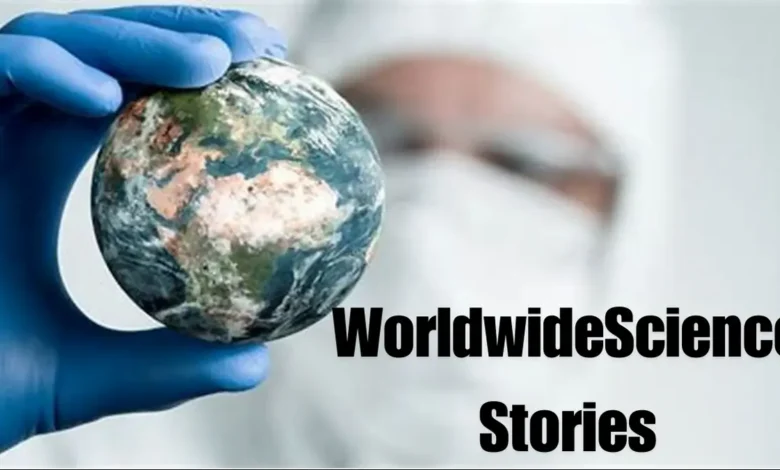Introduction to worldwidesciencestories
Welcome to the captivating realm of worldwidesciencestories, where scientific discoveries unfold like pages in a thrilling novel. Journey with us as we delve deep into the fascinating world of groundbreaking research, innovative technologies, and ethical dilemmas that shape our understanding of the universe. Prepare to be amazed by the top 5 most intriguing scientific discoveries of all time and learn how these advancements have revolutionized society. Join us on this exhilarating exploration of discovery and knowledge!
The Importance of Scientific Discoveries
Science has shaped the world as we know it, paving the way for progress and innovation. Scientific discoveries have revolutionized industries, improved healthcare, and expanded our understanding of the universe.
From discovering life-saving medications to unlocking the secrets of the cosmos, science plays a crucial role in addressing global challenges and improving the quality of life. With scientific breakthroughs, many modern conveniences we take for granted today would exist.
Moreover, scientific discoveries drive economic growth by creating new opportunities for technological advancements and fostering entrepreneurship. By pushing boundaries and challenging existing knowledge, scientists continuously push humanity toward a brighter future.
The importance of scientific discoveries cannot be overstated. They fuel curiosity, inspire creativity, and enable us to tackle complex problems with evidence-based solutions. Embracing scientific exploration is critical to shaping a sustainable and prosperous world for future generations.
Top 5 Most Fascinating Scientific Discoveries of All Time
Have you ever wondered about the most mind-blowing scientific discoveries that have shaped our understanding of the world? Let’s deeply dive into some of history’s top 5 most fascinating scientific breakthroughs.
First on our list is Sir Isaac Newton’s discovery of gravity. The moment an apple fell from a tree, it sparked a revolution in physics that continues to influence how we perceive the universe today.
Next, we must recognize Alexander Fleming’s accidental discovery of penicillin. This chance observation led to the development of antibiotics, saving millions of lives and revolutionizing modern medicine.
Moving on, Albert Einstein’s theory of relativity transformed our understanding of space and time. This groundbreaking concept paved the way for technological advancements, like GPS systems.
Marie Curie’s research on radioactivity earned her two Nobel Prizes and laid the foundation for nuclear physics and medical treatments like radiation therapy.
Rosalind Franklin’s work with X-ray diffraction, along with Watson and Crick, played a crucial role in uncovering DNA’s double helix structure.
The Process of Scientific Discovery: From Hypothesis to Publication
Have you ever wondered how scientific discoveries influence our understanding of the world around us? It starts with a hypothesis – a proposed explanation for a phenomenon that needs testing. Scientists then design experiments to gather data and test their hypotheses rigorously.
Researchers can either support or refute their initial ideas through meticulous observation, analysis, and interpretation of results. This iterative process leads to new insights and sometimes unexpected findings that challenge existing theories.
Once the research is complete, scientists document their findings in academic papers before submitting them for peer review. Peers in the same field critically evaluate the study’s methodology and conclusions to ensure accuracy and validity.
After rigorous scrutiny, accepted papers are published in reputable scientific journals, where they contribute to humanity’s collective knowledge base. This journey from hypothesis to publication is about individual discovery and advancing science for the greater good.
The Role of Technology in Advancing Science
Technology is crucial in propelling scientific discoveries forward, revolutionizing how researchers conduct experiments and analyze data. From high-powered microscopes that allow scientists to observe minuscule details to supercomputers that can process massive amounts of information in seconds, technology has opened up new avenues for exploration and innovation.
Advancements in artificial intelligence have enabled researchers to sift through vast datasets efficiently, identifying patterns and connections that may have otherwise gone unnoticed. With the help of virtual reality simulations, scientists can visualize complex concepts and experiment with different scenarios in a virtual environment before moving into physical trials.
In fields like genomics and space exploration, cutting-edge technologies like CRISPR gene editing tools and powerful telescopes are expanding our understanding of the universe on a molecular level. Technology integration continues to push boundaries, allowing for unprecedented collaborations between disciplines and driving scientific progress exponentially.
Ethical Concerns in Scientific Research
Ethical concerns in scientific research are paramount to ensuring the integrity and credibility of discoveries. Researchers must navigate a complex landscape of moral considerations, balancing the pursuit of knowledge with the well-being of study subjects.
One primary ethical concern is informed consent – participants must fully understand the risks and benefits of their involvement before agreeing to participate in experiments or trials. Additionally, researchers must uphold principles such as confidentiality and respect for autonomy when conducting studies involving human subjects.
Animal research also raises ethical dilemmas, prompting discussions on minimizing harm and maximizing welfare for experimental animals. Striking a balance between scientific progress and animal welfare is crucial.
Moreover, data fabrication or manipulation issues can undermine scientific findings’ trustworthiness. Maintaining transparency and honesty throughout research is essential to upholding ethical scientific standards.
Impact of Scientific Discoveries on Society and the Future
Scientific discoveries can shape society and pave the way for a brighter future. From advancements in medicine that save lives to innovations in technology that enhance our daily lives, these breakthroughs impact us all. Take the discovery of antibiotics, for instance, which revolutionized healthcare by effectively treating bacterial infections.
Moreover, scientific breakthroughs like renewable energy sources are crucial in combating climate change and ensuring a sustainable future for future generations. The development of vaccines has eradicated deadly diseases and improved global public health significantly.
Innovations such as artificial intelligence and gene editing promise to tackle complex challenges ahead. However, with great power comes great responsibility – ethical considerations must always guide scientific research to prevent misuse or harm.
As we look towards the horizon of endless possibilities driven by science, we must recognize and appreciate how these discoveries continue to transform our world. Embracing progress while staying vigilant about potential consequences is critical as we navigate this ever-evolving landscape together.
How to Stay Updated on the Latest Worldwidesciencestories
Are you keen on staying in the loop with the latest fascinating scientific discoveries from around the globe? Here are a few tips to ensure you’re always up-to-date with worldwide science stories.
First and foremost, make use of technology to your advantage. Follow reputable science journals, websites, and social media accounts that share cutting-edge research findings. Setting up alerts or subscribing to newsletters can also help you receive real-time updates effortlessly.
Additionally, consider joining online forums or communities where enthusiasts discuss recent scientific breakthroughs. Engaging in conversations with like-minded individuals can keep you informed and provide valuable insights and perspectives on various studies.
Attending virtual conferences or webinars hosted by renowned scientists and institutions is another fantastic way to stay abreast of the most current developments in the world of science. These events offer a firsthand look at groundbreaking research before it’s widely publicized.
Remember to underestimate the power of networking within the scientific community. Building relationships with professionals in different fields can open doors to exclusive information and opportunities for collaboration that may lead to exciting discoveries.
Conclusion
In a world full of endless possibilities and remarkable scientific discoveries, worldwide science stories serve as a beacon of knowledge and inspiration for all. By delving into the fascinating world of science, we gain insights into our universe, push the boundaries of human understanding, and shape future generations.
As we continue to explore the depths of scientific research and innovation, let us remember these discoveries’ profound impact on society and the world at large. From groundbreaking inventions to revolutionary theories, each new advancement brings us one step closer to unlocking the mysteries of our existence.
So stay curious, stay informed, and never stop asking questions. The journey through science is an ever-evolving adventure filled with wonder and possibility. And with platforms like worldwidesciencestories guiding us along the way, there is no limit to what we can achieve together in pursuit of knowledge and discovery.
Also Read: https://usatimenetwork.com/




